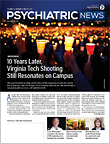Patients with type 2 diabetes who are night owls are more likely to report symptoms of depression than early birds, who follow early-to-bed, early-to-rise sleep routines, according to a study presented at the annual meeting of the Endocrine Society in Orlando, Fla., last month.
Patients with type 2 diabetes are already known to be at a greater risk for depression than the general population. Previous studies have shown that untreated depression can lead to adverse patient outcomes involving diabetes self-care, blood glucose control, and complications of diabetes, said lead investigator Sirimon Reutrakul, M.D., an associate professor at Mahidol University Faculty of Medicine, in Bangkok, Thailand.
Diabetics with a “later or evening chronotype,” a preference to go to bed late and wake up late, tend to experience more symptoms of depression than those with the disease who turn in early and wake up early, an “early or morning chronotype.” A chronotype is the tendency, possibly from a genetic-environment interaction, for an individual to sleep at certain times during a 24-hour period. Previous studies have also found higher rates of depression among night owls in the general population.
These findings, said Reutrakul, support an association between circadian system regulation and psychological functioning in patients with type 2 diabetes. She emphasized, though, that this research does not prove cause and effect.
“We need to further explore a combination of interventions that help with circadian timing, such as light therapy and melatonin,” she said. “Learning more about the relationship between depression and circadian functioning might help us figure out strategies to improve physical and mental health for patients with diabetes.”
Because geographic location may influence chronotypes (with a greater morning preference near the equator), the investigators studied diabetic patients in Chicago and Thailand. Chronotype was assessed using the Morningness-Eveningness in the Thailand group. Depressive symptoms were evaluated by the Center for Epidemiologic Studies Depression scale (CES-D). Sleep quality was determined using the Pittsburgh Sleep Quality Index (PSQI). Demographics, diabetes history, and complications were collected. HbA1c values were retrieved from medical records.
Researchers found that the “later phenotype” was significantly associated with higher CES-D scores. This finding remained constant even after the researchers adjusted for sleep quality, age, sex, ethnicity, insulin use, PSQI score, and other factors that could affect depression.
The U.S. group consisted of 194 patients, and 70 percent were women. Of the 282 patients in the Thai group, 67 percent were women. Chicago patients answered the questionnaires between February and early April; patients in Thailand, where there is little seasonal weather variation, participated throughout the year.
The study, “Later Chronotype Is Associated With Greater Depressive Symptoms in Type 2 Diabetes Patients: A Study in Two Different Ethnic Cohorts,” was funded by Rush University Medical Center in Chicago, the Endocrine Society of Thailand, Mahidol University Faculty of Medicine, and Faculty of Medicine Ramathibodi Hospital in Bangkok. ■
